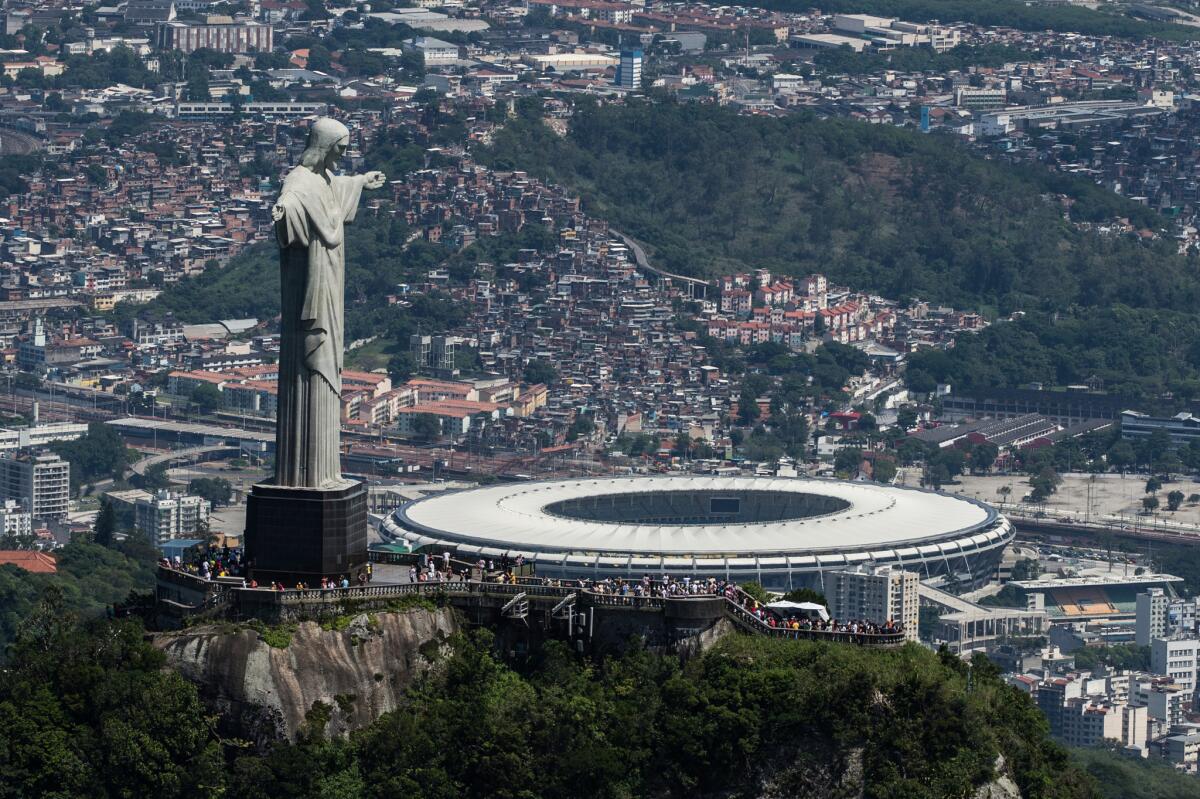Commentary: Rio Olympics must face reality of Brazil’s political turmoil and economic chaos

- Share via
With Brazil spiraling into political chaos and getting hit by a severe economic downturn, it’s easy to forget that Rio de Janeiro will host the 2016 Summer Olympics in only four months.
The crisis of democracy is using up all the political oxygen in the country. Brazilian President Dilma Rousseff is facing possible impeachment — which she’s openly calling “a coup” — in front of a commission with more than half its members facing fraud or criminal charges. The political class in Brazil is rife with corruption.
Meanwhile Brazil’s economy is gyrating. The country is suffering its worst recession since the 1930s. All three major rating agencies have downgraded Brazil’s investment-grade credit rating. Add the Zika virus and you have a recipe for gridlock. Against this backdrop, the 2016 Rio Olympics have been relegated to mere afterthought.
This has been a godsend for the Rio 2016 Olympic Organizing Committee, which has bumbled clumsily through the pre-Games planning process. To be sure, it has improved mightily since 2014 when International Olympic Committee Vice President John Coates proclaimed Rio’s preparations “the worst I have experienced,” even “worse than Athens,” where construction for the 2004 Games fell so far behind that the IOC considered adding nailbiting as an Olympic sport.
As the Olympics approach, one question arises: Will venues be completed on time? In the modern history of the Olympics the answer has always been yes. Despite major advances in venue construction, many Games experts are concerned that Rio 2016 will flip the script.
The Olympic velodrome is woefully behind schedule. Organizers postponed a test event (essentially dry-run trials designed to iron out the organizational kinks) until late June. Rio 2016 honchos have vowed to complete the track by May 31, but they’ve made similar promises without following through. The president of the international federation of cyclists admitted there is “no plan B” if the track is not completed. “It’s not impossible to have Olympic track racing without a test event,” he said, “but it’s not desirable; it makes it harder for everybody.”
Construction at the Deodoro Olympic Complex — set to host 11 Olympic sports, including equestrian events and whitewater kayaking — has been paralyzed by a recent judicial decision to halt payments from Brazilian bank Caixa to the consortium in charge of completing the venue complex. The firms spearheading the consortium — Queiroz Galvão and OAS — are connected to the Lava Jato (Car Wash) corruption scandal that’s roiling the country.
While Olympic contracts have yet to be directly linked to the scandal, Odebrecht, the Brazil-based construction company that’s implicated in the Lava Jato scandal, oversees more than half the Olympic building contracts. Last month, Marcelo Odebrecht, head of Latin America’s biggest construction firm, was sent to prison for 19 years in a bribery and money laundering case. Odebrecht even had a separate “bribe department” dedicated to payola. Many in Brazil see it as inevitable that the Olympics will be dragged into the sludge of bribery and corruption.
There’s also the extension of the Rio Metro from the tourist-friendly Ipanema and Copacabana area to Barra da Tijuca, where the major Olympic hub is. Boosters call the subway a “sustainable transport legacy” that will benefit everyday Rio residents. But economic and political factors have starved the project of funds, slowing construction.
In February, Rio Mayor Eduardo Paes — known in secret Odebrecht documents as “the Jumpy One” — warned the IOC that there was a “high risk” the new metro line might not be ready in time for the Olympics. His back-up plan was a fleet of buses. Another option being floated would make the subway a nonstop pipeline for Olympic tourists traveling from the south zone to the Olympic zone. This would leave everyday cariocas— thousands of whom have been evicted from their homes to make way for Olympic transport upgrades — on the sidelines.
Even Olympic organizers are experiencing turmoil. The past couple weeks have brought the ousting of the sports minister overseeing the Olympic project and the resignation of an Olympic security honcho who openly criticized Rousseff in an email he sent to subordinates.
Beyond all this, there’s no getting around the fact that billions are being spent on the Olympics at the same time that hospitals are being shuttered and education funding is being slashed. With great fanfare Olympic organizers announced $500 million in spending cuts earlier this year. But the Brazilian government recently cut three times that amount from its health and education budgets. Recently Francisco Dornelles, the acting Governor of Rio de Janeiro state, suggested it might be necessary to sell property to address the state’s “tragic” finances. The longtime politico said, “This is the worst situation I’ve seen in my political career.”
Back in 2009 when Rio bidders made their Olympic pitch, they emphasized that Brazil was “a progressive, democratic country” and that “the Brazilian economy is stable”—factors that helped persuade the IOC to award South America its first Olympic Games. Oh, how times change. Brazil’s political chaos has afforded Rio organizers a tiny respite from deeper scrutiny. But their grace period is ending. Time to face reality: Brazil has a population in full rumble, a perfect storm for anti-Olympics activism.
Jules Boykoff teaches political science at Pacific University. He is the author of three books on the Olympics, most recently “Power Games: A Political History of the Olympics.” His writing on the Olympic Games has appeared in outlets like the New York Times, the Guardian and the San Francisco Chronicle.
More to Read
Go beyond the scoreboard
Get the latest on L.A.'s teams in the daily Sports Report newsletter.
You may occasionally receive promotional content from the Los Angeles Times.









